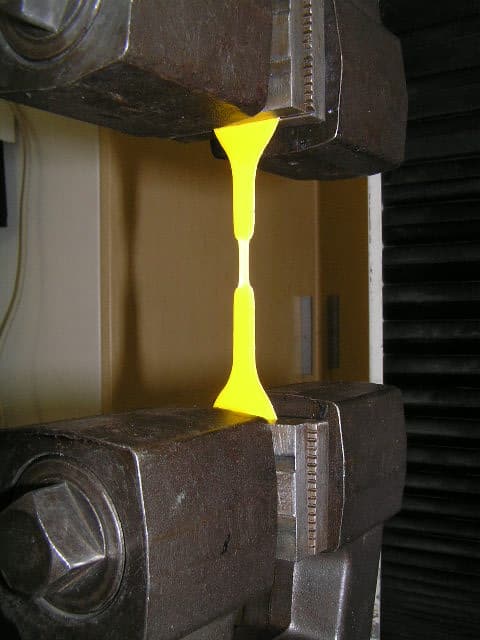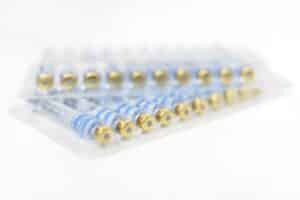Plastic Testing Lab & Services
Micom Laboratories is a Canadian material testing laboratory serving customers in various industries across North America, including aerospace, automotive, medical devices, and military. As a well-established plastic testing lab, we offer fast, accurate, and reliable plastic testing services using standard methods like ASTM D638, ISO 4892, and ASTM D790. Accredited to ISO/IEC 17025, our testing laboratory is equipped to meet all your plastics testing needs with unparalleled quality and quick turnaround times.
Why Test Your Plastics?
Testing your plastic materials and components is crucial to your product’s success and your company’s reputation. Quality testing provides several key advantages:
- Predict Product Longevity: Plastic testing helps predict product lifetime by optimizing material selection to prevent costly failures.
- Ensure Regulatory Compliance: Professional testing verifies that your products meet all applicable standards and legal requirements, providing the documentation needed for certifications and audits. This is particularly valuable for manufacturers in regulated industries like medical devices, aerospace, and automotive.
- Build Customer Confidence: Laboratory testing of your plastics demonstrates your dedication to quality and reliability, builds customer trust, and helps you stand out in competitive markets.
- Protect Against Product Liability: Comprehensive testing helps protect your company by validating product safety and performance before market release, significantly reducing risks and potential liability issues.

Our Plastic Testing Services
As a plastic testing laboratory, Micom offers comprehensive mechanical and physical testing services for plastics as part of its polymer testing services. Our most popular tests include hardness and tensile property testing of plastics. Whether for product development, quality control, or regulatory compliance, our ISO/IEC 17025 accredited laboratory provides reliable data to meet the needs of your industry.
Mechanical & Physical Properties Testing of Plastics
Mechanical Strength
Comprehensive evaluation of material strength under various forces and conditions essential for structural and load-bearing applications.
- Tensile Testing: ASTM C297, ASTM D638, ASTM D882, ASTM D1623, ISO 527
- Compressive Testing: ASTM D695
- Flexural Testing: ASTM D790, ASTM D6272, ASTM D7249, ISO 178
- Tear Resistance: ASTM D1922, ASTM D1876
- Adhesion Test: ASTM D4541
Impact & Surface Properties
Assessment of material durability, surface characteristics, and resistance to sudden forces or continuous wear.
- Impact Testing: ASTM D1709-A, ASTM D3420, ASTM D4226, ASTM D5420
- Hardness Testing: ASTM D2240
- Abrasion Resistance: ASTM D4060
- Friction Testing: ASTM D1894
Environmental & Long-term Performance
Evaluation of material behavior over time and under various environmental conditions.
- Weathering & Aging: ASTM D570, ASTM D2126, ASTM D2565, ASTM D3045, ASTM D4329, ASTM D4355, ASTM D4459, ASTM D5071, ASTM D5208, ASTM F1980, ASTM G154, ASTM G155, ASTM F1515, ISO 4892
- Automotive Standards: PV 3929, PV 3930, SAE J2412, SAE J2527
Optical & Aesthetic Properties
Analysis of material appearance and optical characteristics.
- Color Measurement: ASTM D2244
- Gloss Testing: ASTM D523
- Transparency Analysis: Haze
Why Choose Micom Laboratories for Plastic Testing
Micom Laboratories is an ISO/IEC 17025 accredited laboratory offering comprehensive plastics testing services. Drawing on over 25 years of expertise, our material testing technicians and engineers can develop efficient, customized test plans to meet your specific needs. We pride ourselves on delivering detailed, accurate, and easy-to-understand results to help you make informed decisions.
Talk to one of our experts today to find out how we can help. Our plastic testing lab is equipped with a wide range of specialized instruments for material testing, including impact testers, hardness testers, climatic chambers, QUV weathering cabinets, and more.
Plastics We Test for You
Our testing capabilities encompass the complete range of commercial plastics, from synthetic plastics used in packaging and construction to semi-synthetic plastics used in medical devices and sustainable consumer goods.
Common Types of Plastics
| Type | Category | Characteristics | Common Uses |
| Polyethylene (PE) | Synthetic | Lightweight, strong, and flexible | Packaging films, bags, containers |
| Polypropylene (PP) | Synthetic | Rugged and resistant to chemicals | Automotive parts, textiles |
| Polyvinyl Chloride (PVC) | Synthetic | Durable and versatile | Pipes, window frames |
| Polystyrene (PS) | Synthetic | Can be solid or foamed | Disposable cutlery, insulation |
| Polyethylene Terephthalate (PET) | Synthetic | High strength-to-weight ratio | Beverage bottles, food containers |
| Acrylonitrile Butadiene Styrene (ABS) | Synthetic | Tough, rigid, and impact-resistant | Electronic housings, automotive trim |
| Polytetrafluoroethylene (PTFE) | Synthetic | Non-stick, heat-resistant, and low friction | Cookware coatings, industrial seals |
| Polycarbonate (PC) | Synthetic | Transparent, impact-resistant, and heat-resistant | Eyewear lenses, electronic displays |
| Cellulose Acetate (CA) | Semi-synthetic | Transparent, glossy, tough, and biodegradable | Textiles, cigarette filters, photographic film, tool handles |
| Rayon | Semi-synthetic | Soft, absorbent, and versatile | Clothing, bedding, surgical products |
| Cellophane | Semi-synthetic | Thin, transparent, and moisture-resistant | Food packaging, adhesive tapes, dialysis tubing |

Plastic Testing for Medical Device Packaging
Plastic testing is critical for medical device packaging, where material integrity directly impacts product sterility and patient safety. From sterile barriers to protective films, packaging materials must withstand sterilization processes and shipping impacts and maintain their seal integrity until the point of use. As a plastic testing lab, Micom can ensure compliance with medical standards and validate essential barrier properties to prevent contamination.
More About Our Plastic Testing Lab and Services
Micom Laboratories offers comprehensive materials testing services beyond plastic testing. Our expertise includes polymer testing as well as composite material and adhesive testing. We specialize in environmental simulation through accelerated aging and UV exposure testing, helping you validate your materials’ long-term performance.
Download our brochure for a quick overview of our paint, coating, and polymer testing services.
Frequently Asked Questions About Plastic Testing
What are the main differences between compressive and flexural strength testing for plastics?
Compressive and flexural strength tests for plastics evaluate different material properties under distinct loading conditions. Compressive testing assesses a material's resistance to crushing forces, while flexural testing measures its ability to withstand bending. These tests differ in specimen shape, loading method, and stress distribution, providing insights into material behavior for various applications.
Do you offer cyclic environmental testing for plastics?
We can perform cyclic testing, combining multiple environmental stresses like temperature, humidity, and UV exposure to simulate real-world conditions that are most susceptible to impacting your plastic's longevity and performance.
What types of accelerated weathering tests do you offer for plastics?
QUV fluorescent UV exposure (ASTM D4329, ASTM D4587, ASTM G154) Xenon arc exposure (ASTM G155, ISO 4892) Custom weathering protocols to simulate specific environments
What properties do you evaluate after UV exposure tests on plastics?
We can assess various properties before and after UV exposure, including: Color change and yellowing Gloss retention Mechanical properties (tensile strength, elongation, impact resistance) Surface degradation (chalking, cracking)
How does plastic testing ensure regulatory compliance?
Plastic testing ensures that your products meet all applicable standards and legal requirements by providing documented evidence of compliance. This is particularly crucial for industries like medical devices and automotive, where adherence to regulations is mandatory for market entry. Our accredited plastic testing laboratory conducts tests based on recognized standards (e.g., ASTM, ISO) to validate the safety and performance of your materials.


